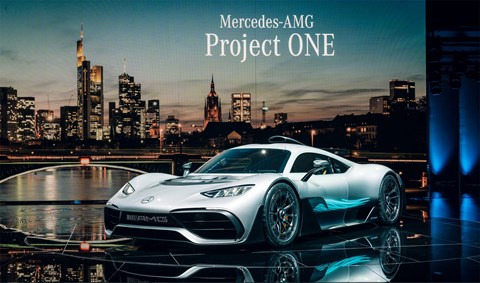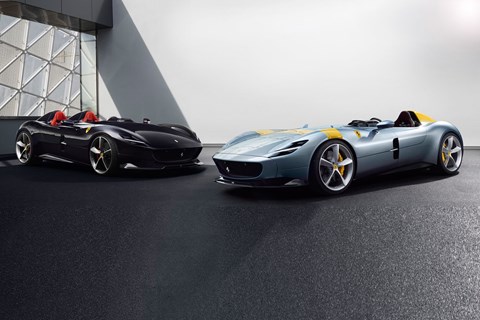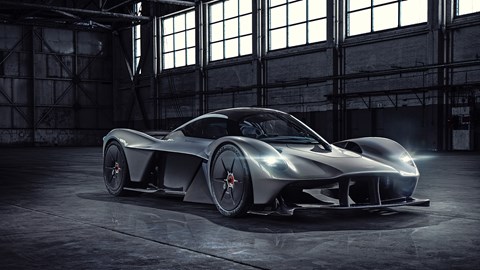► Exploring the new breed of hypercar
► Gavin Green on the new supercars
► Valkyrie, One, SP1, SP2, Senna GTR…
Another day, another hyper-priced hyped-up hypercar. Soon after deliveries began of the £750,000 Senna, the newest member of McLaren’s Ultimate series to hit the road or track, came news of the Aston Martin Project 003, ‘descendant of the Valkyrie’ (which hasn’t even been built yet).
Project 003 is a more road-friendly version of Adrian Newey’s techno-wonder, limited to 500 cars and due in 2021. It even has space for luggage, which the Valkyrie does not. Apart from this nugget Aston released few details, the first time in sports car history that boot space is the headline act.
Then, a few days later, came confirmation that Mercedes is producing its first modern hypercar, the AMG One (below). It uses F1 tech, apparently has 1086bhp and will be the first Mercedes road car made and engineered in the UK, just like Lewis’s GP racer.

Just 275 examples will be made, at more than £2 million each. No doubt most will be carefully sequestered, like turbocharged Titians, as owners anticipate rocketing values, if never actually experiencing the rocket-like performance. Alas, this is the sad, cloistered life of a 21st century hypercar.
Then, less than a week after the Mercedes announcement, came the Ferrari SP1 and SP2 Monzas, unveiled in Paris, priced at £1.6 million – and, naturally, all 499 will be quickly sold out to the Ferrari faithful who will mostly keep them in hermetically sealed garages and watch values soar.
Their 12 lovely little pistons will be as inactive as bars of gold stored in a Swiss bank, their forged alloy wheels as immobile as a Yuan dynasty vase, their fetching barchetta-style bodies as stationary as Venus figurines. If sampled at all, most will be driven sparingly, cleaned religiously and then returned to their garage vaults. The SP1 and SP2 are first of a new range of limited-edition Icona cars that mimic old Ferraris in style.

Coming up is the McLaren Senna GTR, for those who think the regular Senna is a bit of a wuss. Naturally, its performance will be far beyond the capabilities of owners. Then will come another McLaren Ultimate car, the Speedtail. It’s a three-seat successor to the marvellous McLaren F1 and has 986bhp. Only 106 will be built at £1.75m plus taxes each. All are pre-sold.
Amazingly, Adrian Newey’s Valkyrie (deliveries start in 2019) promises to operate on another performance plane again. The goal for the fastest version is to deliver F1 lap times, a stupendous achievement for a road-based car. Trouble is, owners will need F1-type talent to deliver.
Not long ago, new hypercar introductions were rare. That all changed when they became collectibles for ‘high-net-worth individuals’, rather than cherished driving machines for affluent enthusiasts. McLaren became newly profitable when the P1 sold out. Aston steered itself into the black when Valkyrie money flooded in. These are big-profit products. Plus, as Aston Martin and Ferrari are now self-styled ‘luxury lifestyle brands’, presumably bottom lines are more important than redlines.

All these cars will be fantastic, never mind their absurd unusability for the road. But when profit is the priority, when cars are mostly bought not to drive, and when their capability is far beyond their owners’, then a bit of the magic goes missing. Years ago, hypercars were either road versions of cars built to win races (Jaguar D-Type, Ferrari 250 GTO, Ford GT40) or technical tours de force designed to elevate and enlighten road-car expertise (Porsche 959, McLaren F1). That’s no longer true, although the AMG One and Valkyrie are certainly technically ambitious, and there is even loose talk of Valkyries racing, the best way to turn a fast car into a legendary one.
It is also sobering to reflect that probably the two greatest top-end sportsters of all – the Ferrari 250 GTO and McLaren F1 – were initially sales underachievers. There simply wasn’t the demand. Now, they’re worth about £50 million and £12 million respectively. They were bought for the thrill of the drive, not for return on investment. A few GTOs are still thrashed energetically at historic races, including the Goodwood Revival. Such nobility of purpose elevates a car’s reputation, as well as – paradoxically – its value.
More blogs and opinion pieces by CAR magazine